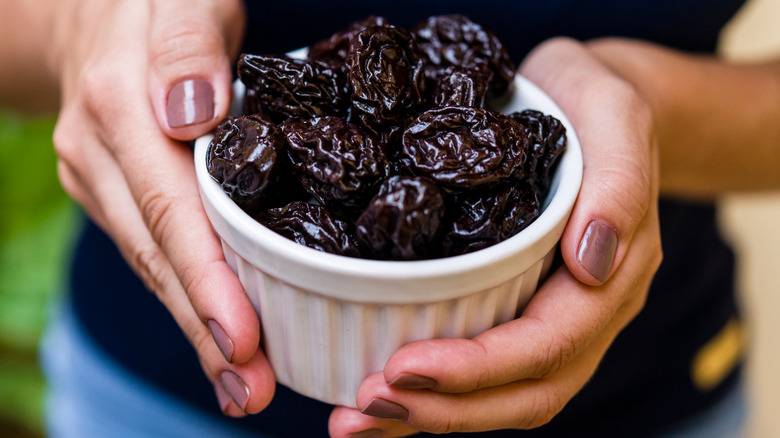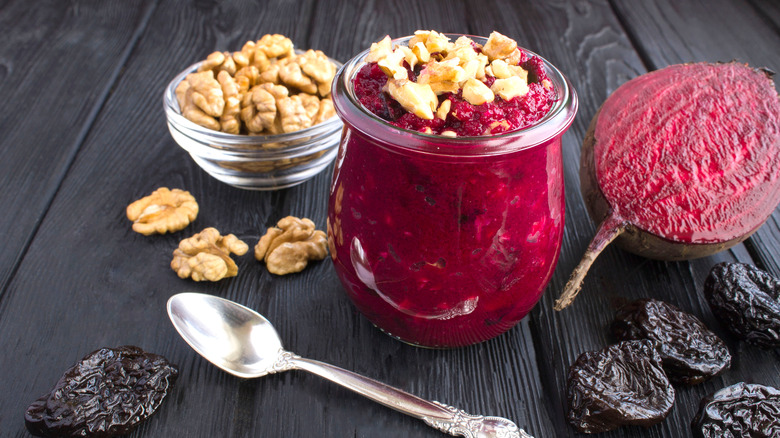Eat More Of This Fruit To Prevent The Effects Of Osteoporosis
Each year, more than 1.5 million Americans suffer fractures due to osteoporosis. This chronic disease affects approximately 10 million adults over the age of 50 in the U.S., impairing their ability to walk, run, and lead an active lifestyle. Its causes range from aging and hormonal fluctuations to nutrient deficiencies. For example, estrogen levels decrease during menopause, which may increase bone loss in women, explains Johns Hopkins Medicine. Lack of exercise, smoking, alcohol abuse, and other lifestyle factors may play a role, too.
Osteoporosis is easier to prevent than treat, suggests Johns Hopkins Medicine. Small things, such as upping your calcium intake and limiting alcohol, can make all the difference. Researchers also recommend a diet high in protein, vitamin D, and potassium, three nutrients that can indirectly improve bone health. Potassium, for instance, may reduce calcium loss and increase bone density, according to clinical evidence published in Osteoporosis International.
If you already have this disorder, your doctor may prescribe medications like Calcitonin, Denosumab, or Raloxifene. Depending on their composition, these drugs may lower your risk of fractures, stimulate bone formation, or reduce bone loss — but what you eat matters, too. As it turns out, there's one fruit that may help prevent or slow down osteoporosis by keeping your bones strong.
Fill up on prunes to reduce bone loss
Prunes are best known for their high fiber content, which may help prevent constipation. What you might not know is that they also contain potassium, a mineral that supports calcium metabolism, says Johns Hopkins Medicine. Moreover, recent evidence suggests that prunes can improve bone health in postmenopausal women due to their antioxidant and anti-inflammatory effects, reports Advances in Nutrition. These delicious fruits may help increase bone density and protect your bones from oxidative damage, making it easier to manage osteoporosis.
Previous studies had similar findings, according to a 2017 review featured in the journal Nutrients. As the researchers note, prunes are higher in vitamin K than other fruits, which may explain their beneficial effects on bone health. Vitamin K regulates calcium levels in the body and prevents this mineral from building up in the arteries, reports a 2015 review published in the journal Integrative Medicine. Quercetin, p-coumaric acid, caffeic acid, and other bioactive compounds in prunes fight oxidative stress, which may help reduce bone loss.
Try adding five to six prunes into your daily diet
In clinical trials, postmenopausal women who ate as little as 3.5 ounces of prunes per day experienced improvements in bone health, notes the journal Nutrients. These fruits are by no means a cure for osteoporosis, but they may help to some extent. Plus, they have no adverse effects and can boost your nutrient intake.
Further research is needed to assess their impact on younger women, men, teens, and other groups. The 2017 study did note that the "average intake of fruit" is generally low for postmenopausal women, but teens 14 to 18 as well. Despite being low, these are actually "critical time points in bone development," so eating more fruits like prunes is important. Medical News Today reports that just adding five to six prunes a day to your diet can make a difference. Something like a banana and prune smoothie can even be a great source of potassium, calcium, and vitamin K — all nutrients needed to prevent osteoporosis — while being a delicious way to treat yourself.


